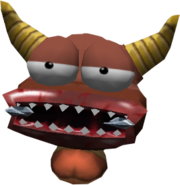Sandworm
| Sandworm | |
|---|---|
 Model from Wario World | |
| First appearance | Wario World (2003) |
The Sandworm[1] (referred to as Big Scorper in the game's European website[2] despite this being the name of an unrelated enemy) is a scythe-armed monster in Wario World. It is the boss of Greenhorn Ruins and the second boss of Excitement Central. The Sandworm appears to be based mostly on antlion larvae, which make sand pits like the one in which the Sandworm is fought and have very large jaws that they use to catch and eat arthropods that fall into said pits. Additionally, its Japanese name references antlion larvae, which largely prey on wandering ants. Its scythe arms seem to reference the praying mantis, an animal whose arms are shaped like scythes. The Sandworm is fought in a large quicksand pit. Its main attack is spitting spiked balls at Wario. Sandworm can be damaged from repeated attacks. It cannot be stunned, and when the Sandworm loses a health skull, it becomes temporarily invincible, and either slashes after Wario with its scythe-like arms or burrows to the center of the arena and spits many spiked balls in random directions. When this happens, the sand pit pulls Wario in much faster. The Sandworm will also strike back with more powerful moves if damaged enough, including slicing Wario with its arms. Later on, Sandworm is relegated to being a regular enemy in Pecan Sands, where its attacks are a bit faster, but it now takes only four cycles to defeat instead of five, and will only attack with its scythes during its invincibility phases.
Gallery
The Sandworm in Pecan Sands.
Names in other languages
| Language | Name | Meaning | Notes |
|---|---|---|---|
| Italian | Scorpione Scarlatto[?] | Scarlet Scorpion |
References
- ^ Stratton, Steve (July 1, 2003). Wario World: Prima’s Official Strategy Guide. Prima Games (American English). ISBN 0-7615-4323-6. Page 34.
- ^ Wario World official site[dead link]
- ^ July 10, 2004. 「ワリオワールド任天堂公式ガイドブック」 (Wario World Nintendo Kōshiki Guidebook). Shogakukan (Japanese). ISBN 4-09-106168-0. Page 151.


